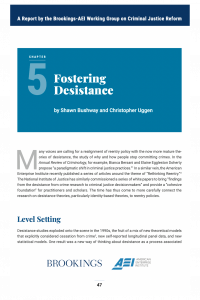A Better Path Forward for Criminal Justice: Fostering Desistance
Shawn D. Bushway and Christopher Uggen, The Brookings Institution
This chapter of the larger A Better Path Forward for Criminal Justice report builds upon growing interest in realigning reentry policy with, as the authors state, more mature theories of desistance, or the study of why and how people stop committing crimes. The authors assert that the time has come to more carefully connect the research on desistance theories, particularly identity-based theories, to reentry policies.
Within the chapter, the authors explore the range of identity-based theories and how every identity theory of desistance involves some degree of agency on the part of the individual. As the authors assert, in desisting, the individual makes choices among a set of socially structured alternatives and develops an identity more consistent with law-abiding behavior than law violation. The challenge for research and policy, they continues, is to support the individual choices and psychological processes that foster desistance, while improving the structural conditions (such as labor and housing markets) that make it more likely.
The body of there report lays out several short-, medium-, and long-term reform recommendations encompassing of desistance literature, including:
Short-Term Reforms
- Move on from the Concept of Reentry
- Flood the Zone with Programs Fostering Adult Development
Medium-Term Reform
- Eliminate Most Collateral Consequences of Criminal Justice Involvement
Long-Term Reform
- Increase Broader Societal Opportunities
